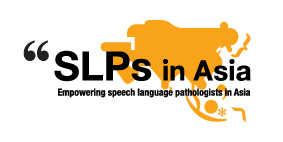Brief History of SLP development
The first speech-language service in Taiwan was provided by Audry Smithson from the United Kingdom (UK) in the neurology department at the National Taiwan University Hospital in 1964 (Wang, 2001). The Taiwan Speech-Language-Hearing Association (TSLHA) was established in 1986 (Chung, 2019). As of May 2022, TSLHA is the national professional and scientific association for 900 members who are speech therapists, audiologists, speech, language, and hearing scientists, students, and affiliates. The main mission of TSLHA is to advance communication science, facilitate continuing professional education, support academic activities nationally and internationally as well as create assessments, diagnostic tools, and therapeutic materials. In 1992, TSLHA began to provide a six-month training program, authorized by the Taiwan Ministry of Health and Welfare (MOHW) for those with a college diploma in nursing, psychology, special education, or a foreign language to become SLPs in departments of rehabilitation in hospital settings (Lee, 1993). This six-month training program focused on learning via a clinical practicum with short lectures on a number of specific topics (e.g., articulation disorders). It did not, however, provide formal courses in diverse areas (Lee, 1993). The first two training programs, held at Taipei Veterans General Hospital, had 20 participants in each training program. This six-month training program was discontinued in 2005 (Chung, 2019).
Education
In 1994, the first four-year undergraduate program in the Speech-Language Pathology and Audiology Division of the Department of Rehabilitation Medicine at Chung Shan Medical University was launched, with 95 program credits (Lee, 1993). These credited courses were adapted from graduate speech-language pathology (SLP) and audiology programs in the United States. In 2000 and 2001, both National Taipei University of Nursing and Health Sciences and National Kaohsiung Normal University established graduate programs in SLP and audiology (Chen et al., 2005). In 2004, the University of Taipei established another graduate program solely dedicated to SLP (Chen et al., 2005). There are currently six graduate programs (five in both SLP and audiology, and one solely in SLP) and six undergraduate programs (five in both SLP and audiology, and one solely in SLP) in Taiwan. Graduates who have completed at least six months or at least 375 hours of practical training are eligible for the qualification examinations for speech therapists and hearing specialists (i.e. audiologists). Students attending either graduate or undergraduate programs in SLP and audiology are qualified to practice as speech therapists or audiologists after passing the qualification examinations and obtaining a certificate from MOHW (2008a, 2008b). A graduate degree is not required for speech therapists or audiologists to work in Taiwan. Speech therapists’ practice includes: assessment and treatment of articulation, fluency, voice and resonance disorders; assessment and treatment of language comprehension and expression disorders; assessment and treatment of swallowing disorders; evaluation and training for the use of augmentative and alternative communication systems; assessment and treatment of delayed language development; operation of instruments with language, speech or swallowing function; and other speech therapy businesses as approved by the central competent authority (MOHW, 2008b). Audiologists’ practice includes: evaluation of the auditory system; assessment of non-organic hearing loss; evaluation of vestibular function of the inner ear; evaluation of the use of hearing aids; pre-operative and post-operative audiological assessment of artificial cochlea (electronic ear); hearing restoration and rehabilitation; and other hearing specialist businesses as approved by the central competent authority (MOHW, 2008a). Currently, most licensed speech therapists and audiologists in Taiwan have completed undergraduate and/or graduate programs in speech-language pathology and audiology, while others have received a six-month speech therapist or audiologist training program provided by TSLHA (Yeh, 2015), which was discontinued in 2005 (Chung, 2019).
Licensure system
The Ministry of Examination (2024) schedules Second Senior Professional and Technical
Examinations for speech therapists and hearing specialists (i.e., audiologists) administered in written form each year. Candidates for the Senior Professional and Technical Examinations must be graduates of public or accredited higher education institutions, or of an equivalent level of foreign institutions recognized by the Ministry of Education (Ministry of Examination, 2024). Additionally, these candidates must have completed at least six months or at least 375 hours of practical trainings. Six professional subjects for Senior Professional and Technical Examinations for speech therapists and hearing specialists (i.e., audiologists) are included (Ministry of Examination, 2024). The speech therapist certificate and hearing specialist (i.e., audiologist) certificate are authorized by MOHW, and practice licenses are registered and obtained by the municipality or county (city) authorities at the intended place of practice (2008a, 2008b).
